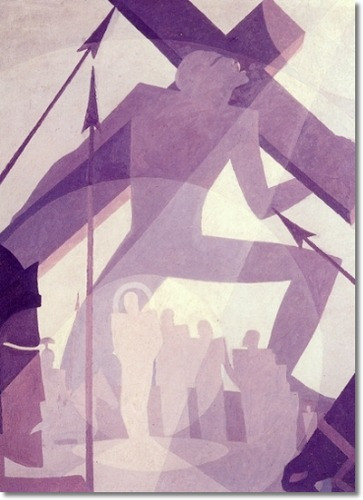[Trigger warnings for abuse, rape, and violence against oppressed groups]
I recently wrote a blog post for Rachel Held Evans in which I talked about how many popular images of God are abusive. Someone left this comment:
I read something once -and it has troubled me since – that God requiring Jesus to die on the cross ‘for our sins’ was the equivalent of child abuse. I would love to hear some opinions on this matter.

A few commenters jumped in to say that since Jesus IS God, it was a personal choice and therefore not abusive and, well you know the rest. I’m sure you’ve heard justifications for this theology many times. My opinion on the matter was that penal substitution is still a terrifying theology about an abusive God.
I’m guessing many people that I know (including some of my readers) would be shocked to hear that I do not believe that God had to die because humans were just so evil and God was just so wrathful and required a blood sacrifice. I even know many self-identified progressive Christians who would probably assume that I wasn’t really a Christian if I told them I didn’t believe that Jesus died in the place of wicked human beings in order to save us from our sins.
I take a more, shall we say, literalist viewpoint.
God didn’t kill Jesus. People in power killed Jesus.
My friend David Henson recently said on Facebook:
If atonement is literally at-one-ment — being at one with — perhaps it is God that experiences atonement in the crucifixion by being with us and being at one with us in death.
I would take this even further. Christ didn’t experience just any death, but a death reserved for those who challenged the oppressive power structures of the time. Jesus’ teachings of liberation threatened Rome. But even more so, they threatened the religious leaders of the day: spiritually abusive leaders who had turned their backs on Judaism’s message of justice and mercy and had twisted the teachings to oppress others.
Jesus stood with the oppressed. He healed on the Sabbath. He advocated for the poor. He spoke out against the abuse of women.
And those in power killed him for it. They silenced his message (but it couldn’t quite stay dead, could it?).
Maybe this is the real message of the cross. That the God of all creation loved the oppressed enough to become one with them, even in death–the ultimate tool of oppressive forces.
I think of an article about the book The Cross and the Lynching Tree, by liberation theologian James Cone. Cone makes a comparison between the crucifixion of Jesus and the lynching of black people throughout the 19th and 20th centuries.
The cross and the lynching tree interpret each other. Both were public spectacles, shameful events, instruments of punishment reserved for the most despised people in the society. Any genuine theology and any genuine preaching of the Christian gospel must be measured against the test of the scandal of the cross and the lynching tree. Hengel asserts: “Jesus did not die a gentle death like Socrates, with his cup of hemlock. . . . Rather, he died like a [lynched black victim] or a common [black] criminal in torment, on the tree of shame.”
I don’t think many white people like this comparison (as a white person myself, it is challenging and sobering). So white theologians shy away from this comparison, as obvious as it seems. Instead, they embrace a spiritualized version of Christianity in which Jesus is nothing but a sacrifice, meant to save us from some abstract idea of inherited sin. Where Christ’s life of healing the sick, giving sight to the blind, raising the dead, touching the untouchables had nothing to do with his death. Where the promise of liberation and justice given by the Old Testament prophets to the oppressed in Israel is not considered part of the gospel. Where the only real result of Christ’s death and resurrection is that we are free from our sins (though we still sin), and go to heaven when we die (maybe–if we ask nicely).
If we did embrace the similarities between the cross and the lynching tree, it would open the doors to comparing Christ’s unjust death with the many other injustices that go on in our society.
The wife who is raped and beaten by her husband, and then told by her church to stay with him.
One of the transgender people that are murdered every three days.
The Muslim people who are bombed by the United States just because some people who looked like them happened to be terrorists.
The people in poverty who starve to death because they cannot afford food, or die slowly from illness because they cannot afford healthcare.
The woman on the street corner in Detroit who was forced into prostitution at age 11.
The young black man who is shot in the back of the head because he looked threatening.
The young woman from Steubenville who was gang-raped and then shamed for it.
The gay, black mayoral candidate who was beaten, set on fire, and killed in Mississippi.
Christ is crucified again and again as injustice goes on and on.
But the cross means, to the oppressed, that God is on our side.
As James Cone says,
The cross is the most empowering symbol of God’s loving solidarity with the “least of these,” the unwanted in society who suffer daily from great injustices. Christians must face the cross as the terrible tragedy it was and discover in it, through faith and repentance, the liberating joy of eternal salvation.
The cross can empower those who are suffering. It can give us hope. But as James Cone continues,
But we cannot find liberating joy in the cross by spiritualizing it, by taking away its message of justice in the midst of powerlessness, suffering, and death. The cross, as a locus of divine revelation, is not good news for the powerful, for those who are comfortable with the way things are, or for anyone whose understanding of religion is aligned with power.
The cross cannot just mean that we are “saved from sin,” and “going to heaven.” Our speaking about the cross cannot just sound like those cliched platitudes that Christians often tell those who are hurting. The cross that Jesus reclaimed from the Roman Empire has fallen back into the hands of oppressors, becoming a tool of white supremacy, of patriarchy, of heterosexism and transphobia, of the military and prison industrial complex, of those who wage warfare on the poor.
But I want to reclaim it, like Christ did.
If we are to find liberation in the crucifixion, then the cross must stand as a middle finger to oppressive power structures.
The cross of Jesus reveals the ugly truth behind oppressive power, and then the cross mocks that power through the resurrection.
The cross of Jesus calls those of us who are oppressors (most of us–myself included–are oppressed in some contexts and oppressors in others) to humility, repentance, and a new way of living.
The cross of Jesus tells the oppressed–in a world that tries to convince us that we are not even human–that we are not only made in God’s image, but that God came to earth to be made in ours.
The cross of Jesus tells the oppressed that we can take up our crosses and our protest signs and join together, armed with the power of love, to defeat the powers that rape, abuse, and murder us.
The cross of Jesus tells us that they can kill our bodies, but that doesn’t mean they win.















